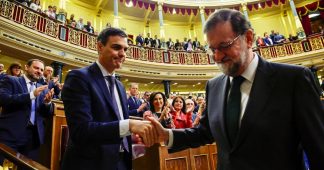After a failed early election gambit, Spain’s prime minister, Pedro Sánchez, has finally accepted Podemos into his government. It’s a huge achievement for the Left — and a way to free Spain of its sharpening nationalist tensions.
With news of a deal, Spain’s corporate and financial interests have reason to come out fighting. Over the summer, they successfully prevented a coalition between the two parties, applying sufficient pressure on acting prime minister Sánchez — aided by efforts from Brussels — to force him to walk away from negotiations. This triggered last Sunday’s repeat general election, the second in six months and the fourth in as many years. The aim of all this was to avoid Spain’s first left-wing coalition since the Second Republic of the 1930s.
Indeed, the talks over summer gave some insight into the hostility to such an arrangement. Then-acting deputy prime minister Carmen Calvo Poyato even told Podemos that it could not take up the Labor Ministry in any prospective government because this would “unnerve” the Association of Business Leaders. As Spanish media reported this week, this same corporate-political machine has “already [been] set into motion” following the news that the two parties have brokered an agreement.
Even for Sánchez, a leader whose career has been marked by constant tactical pivots and zigzagging, this move came out of the blue. The election had been counterproductive, with PSOE losing 750,000 votes and three seats compared to April’s result, while the far-right Vox more than doubled its seat share. Yet the proverbial dust had barely begun to settle on the result before the coalition deal was announced.
There are clear limits to Sánchez’s progressive credentials, from his only hesitant budget deal with Podemos last year (which, in the end, could not find parliamentary backing) to his scuttling of this summer’s negotiations. However, the Socialist leader has demonstrated in the past that he is willing to make concessions to the Left’s agenda and even to “name the enemy,” as Iglesias would have it, when forced to by political necessity. Today, circumstances brought about by his failed electoral gambit mean that by Christmas he could be heading a left-leaning coalition — with Pablo Iglesias as his deputy prime minister, along with figures like Izquierda Unida chief Alberto Garzón and former housing activist Irene Montero in his cabinet.
Yet there are also clear dangers to this government and its capacity to bring change. This “Frankenstein coalition” is born unstable and without a parliamentary majority — a problem set to be exacerbated by the fallout of the the trial of nine pro-independence Catalan leaders, and the far-right reaction it has unleashed. Ever since left-wing and regionalist parties first aided Sánchez’s ascension to the Moncloa Palace in June 2018, he has been reluctant to make this heterogeneous coalition a viable governing option. Today, we are about to see if it can survive.
A Game Changer
The dangers of such a government are owed particularly to the broader context that led to Sánchez’s rapid change of direction. One such factor is the Francoite Vox party’s arrival as a major force of national politics — with the potential this has to reshape the wider political field. The far-right party’s surge to 15.3 percent in Sunday’s election — proving its ability to channel part of the nationalist rage around the Catalan issue into an extremist vote — is clearly a game changer.
Indeed, the election handed renewed initiative to the Right. The conservative Partido Popular (PP) and Vox each secured poor results in the last general election in April — with the former losing more than half its seats and Vox failing to hit the numbers projected by many polls. Going into the campaign for the November 10 repeat vote, Vox was polling in single figures, while the PP was forecast to claw back a significant number of the seats it had lost in April.
Ultimately, the impact of the sentencing in the Catalan trial undoubtedly galvanized Vox. Yet equally as important was the normalization process it underwent in the campaign, together with the results for rival parties within the fragmented right-wing bloc. Even at the outset of the campaign, as Vox’s poll ratings remained in single figures, party leader Santiago Abascal received significant airtime on TV shows that previously did not dare to approach the party for interviews. Meanwhile, the liberal rightist Ciudadanos’s ratings continued to drop after its refusal to negotiate a centrist pact with Sánchez after April.
The right-wing Spanish nationalist reaction to the mass protests and riots across Catalonia was clearly at the heart of Vox’s surge in the final weeks of the campaign. As images of burning vehicles and pitched battles between youths and police were broadcast across the country — with Spanish television framing the demonstrations largely as a kind of breakdown in public order — Vox’s hard-line calls for a state of emergency gained considerable traction.
Vox also exploited the changing nature of political campaigns, with a number of effective PR stunts and a campaign strategy centered largely on social media. Abascal’s aggressive, culture-war-esque rhetorical style made him difficult to counter in the televised leaders’ debate — and a number of bare-faced lies, such as his claim that 70 percent of gang rapes are committed by foreigners, went unchallenged. The stunt carried out earlier the same day by Vox’s Madrid leader, Rocío Monasterio, similarly managed to place Vox at the center of the debate. She declared that “menas” (unaccompanied foreign minors) posed a threat to public safety, right in front of a center for such minors.
Having copied this Trumpian playbook during much of April’s campaign, this time around, the PP found itself caught between taking a hard line on issues like the national question and keeping hold of its traditional conservative base. Vox had no such balancing act to perform. And the raised stakes generated by the polarizing Catalan conflict meant its message chimed with an increasing number of right-wing voters. It, like the PP to a lesser degree, also benefited considerably from the collapse of Ciudadanos’s vote.
At Vox’s election night celebrations, chants of “Go get them! [¡a por ellos!]” rang out — a refrain that fits with its bellicose discourse toward the so-called “enemies of Spain.” Primary targets of this far-right offensive include Catalan independentists and immigrants, but also feminists, gay-rights activists, and progressives more generally. Such is the climate in which the new government is born.
Against the Clock
On election night, the jubilation among Vox supporters stood in stark contrast to scenes outside PSOE headquarters, where the frustration among the party faithful was palpable. As Sánchez attempted to give his victory speech, he was drowned out by chants of “with [Pablo] Iglesias, yes!” and “with [PP leader] Casado, no!” — forcing him to cut celebrations short. This was an incredible act of defiance from activists who had watched as the party leadership disregarded its clear electoral mandate of cooperation with Unidas Podemos in the months after last April’s poll.
Surveying the post-electoral landscape, Sánchez believed he had to act quickly if events were not to get away from him. Six months previously, he had chosen to sit back after topping the polls, looking to force his rivals into a slow war of attrition — with the hope that either Ciudadanos or Unidas Podemos would eventually concede to backing a minority PSOE government. Now a series of factors led him toward the opposite conclusion — that only a swift coalition deal with Iglesias’s party could ensure a route out of the impasse.
After Sunday’s vote, PSOE’s options in terms of potential coalition partners had narrowed after Ciudadanos was wiped out as a major national force. In the run-up to the election, there had been much talk about a potential agreement with the conservative PP — it being supposed that the two historic adversaries could come to a one-off agreement to enable Sánchez’s investiture. Yet Vox’s surge complicated such a scenario. With Abascal’s party now breathing down its neck — and poised to declare any potential concession a gross betrayal — the PP were determined to extract a heavy price for any such deal. Its deputy leader even suggested it would require Sánchez to step aside for another PSOE candidate.
To go down that route would have risked months of further deadlock, and even a possible third election, which an increasingly indignant electorate would not have accepted. A sense of dismay and outright depression at Vox’s surge was evident among large parts of Spanish society — creating a new political urgency. Another reason for the haste was Sánchez’s desire to do a deal before the ruling in a high–profile corruption case involving two former PSOE regional premiers in Andalusia — which could have further complicated talks.
Finally, there was also a recognition that Pablo Iglesias had emerged from the election reinforced. Part of the initial calculation for opting for repeat elections was its potential to reduce Unidas Podemos to a marginal force in Spanish politics. The left vote would be split due to a new rival party headed by Podemos’s former deputy leader Íñigo Errejón — with initial polling suggesting his Más País platform could take as many as fifteen to twenty seats.
Yet the new party never managed to articulate a distinct political profile, with Errejón’s attempts to position Más País resembling something along the lines of the German Greens, which — along with other factors — ultimately prevented it gaining traction over the last month. Its paltry total of three MPs means its future viability is now unclear — in truth, Más País’s principal accomplishment was to split Podemos’s own vote and deny it four MPs.
Nonetheless, Podemos’s thirty-five MPs proved essential to Sánchez if he wanted to make good on his promise of a swift government formation. Having survived a year of internal splits and two grueling general elections, Iglesias was not going to now relinquish his demand for cabinet seats. Instead, on the eve of the election, he signaled to Sánchez that he was willing to take up negotiations from the point where they had left off in July.
Fait Accompli
The negotiations began Monday after lunch and were completed in a matter of hours. What had been impossible to achieve throughout months of on-off talks during the summer was made possible by Sánchez’s newfound engagement. He had not informed his party’s executive of his plans when it met that morning — wanting to present it with a fait accompli, which he would then put to a vote of party activists, rather than allow the PSOE machine and the party’s corporate allies an opportunity to push back.
The initial pre-agreement announced on Tuesday — a more detailed deal will be hammered out in the coming days — represents a certain balancing act. Unlike in July, Sánchez has not placed a veto on Iglesias’s presence in cabinet — the Podemos leader is probably the most likely candidate to take up the post of deputy prime minister, with a portfolio in social policies. Unidas Podemos are likely to take up three further cabinet seats, but the specific ministries are yet to be announced.
In July, Podemos sought to target portfolios with a strong social dimension that had clear spending powers. Accepting that the PSOE was not going to relinquish either the so-called “ministries of state” (defense, interior, justice, and foreign affairs), or the powerful economy and development ministries, it identified the Labor Ministry and the Ministry of Environment and Ecological Transition as its priorities. This time around, Iglesias and Sánchez have agreed not to disclose the exact seats the left-wing force will take until after the coalition government is voted in by a fragmented parliament.
The document signed by the two leaders on Monday sets out a series of priorities for the new government that seem in line with the programmatic agreement reached last July before talks broke down — though exact policy proposals were largely absent from the text and will be announced in the coming days. These commitments include tackling precarious labor conditions, boosting public services, guaranteeing housing as a basic right, progressive tax reform, fighting climate change, and promoting gender equality.
Two other priorities, however, in the text point to the likely limits of Unidas Podemos’s influence. The document commits the new government to a “balanced budgetary” policy, with new social programs having to be paid for out of increased revenue. This is obviously a major concession on the part of Iglesias — as his party’s economic policy has largely been centered on the need for expansive governmental budgets so as to counter the results of a decade of austerity.
Yet with the European Union demanding belt-tightening, and Spain undergoing an economic slowdown, fiscal rigor was a red line for Sánchez. Indeed, to placate Brussels and sell the idea of a left-leaning coalition to other European heads, he insisted on installing Nadia Calviño — a former high official in the European Commission — as the economic deputy prime minister.
These two deputy premiers — Iglesias in Social Affairs and Calviño in Economy — point to what will probably be the struggle that defines the coalition. One of Unidas Podemos’s slogans from the election campaign was that their presence in government would “guarantee the cuts are not forced on those at the bottom, but rather those at the top” — via new taxes on the financial and high-tech sector, a 1-percent increase on large fortunes, and strict policing of the effective corporate tax rate.
The other major concession on the part of Unidas Podemos was to accept PSOE’s leadership on the Catalan crisis — with Iglesias spelling out that he and the other ministers from his formation would be bound by cabinet discipline. Yet with the two parties’ 155 MPs falling short of the 176 needed for a majority, PSOE will also need to secure at least the abstention of Esquerra Republicana (the Republic Left of Catalonia party), whose leader, Oriol Junqueras, is serving a thirteen-year sentence for sedition. Esquerra has called for roundtable talks on the territorial crisis as a condition for facilitating the coalition — its necessary cooperation should force Sánchez to take a softer line on the Catalan issue than he has in recent months.
A Party of Government
Over the last year, as the pressure mounting to back a minority PSOE government continued to rise from several sectors, Iglesias has continued to insist that a full coalition was essential. In part, this reflects the fact that Unidas Podemos was burned on a number of occasions during its year of cooperation with Sánchez’s minority government formed in June 2018. When jointly agreed proposals for rent controls or public spending increases met with pushback from elites, Sánchez’s default position was to retreat.
Accordingly, Iglesias argued that only Podemos’s presence in cabinet could ensure a PSOE government would actually force through the raft of social policies on the table — such as the repeal of neoliberal labor reforms, further increases in the minimum wage, rent controls, and an anti-eviction law. Moreover, once Podemos was in cabinet, the PSOE would have no choice but to seek agreements with it in all legislative areas. This would block off the prospect of “variable alliances” and Sánchez attempting to play the Right and the Left against each other.
There were also party political interests at play in Iglesias’s insistence. Since Podemos was launched five years ago, with the promise of “storming the heavens” of the state, its “clear will to govern — not simply be a party of opposition” has been a cornerstone of its identity. For Iglesias, to relinquish its claim to power risked condemning Unidas Podemos to marginality — a second-tier actor, supporting the “natural” party of government on the Left, namely the PSOE.
Yet others within the party, such as its Andalusian leader Teresa Rodríguez, believe the conditions are not there for Podemos to exercise meaningful leverage in cabinet. In a tweet on Tuesday, party cofounder and member of European Parliament Miguel Urbán echoed these doubts, writing that “a sense of relief must not lead us to lower our guard. To normalize those of us who came to politics to change everything, to provide cover to those who have always impeded such change and to hand the Right a monopoly on [anti-establishment] contestation — these are the risks we need to spell out so as to combat them each day.”
Such concerns will have to remain central to any arrangement that can deliver the change Unidas Podemos seeks, as it opens a new chapter in terms of both its own political evolution and its relationship with PSOE. Even if (unlike in the Portuguese case) the Left’s leaders will be directly present in cabinet, there are also major doubts regarding the durability of this prospective coalition. Born of the most unlikely circumstances, amid sharp nationalist polarization, the Left should be under no illusions as to the enormity of the tasks facing the new administration.











